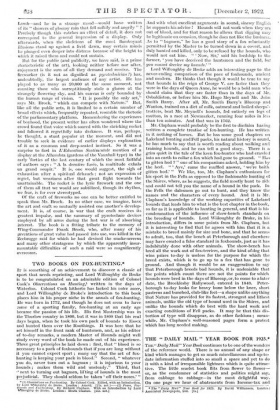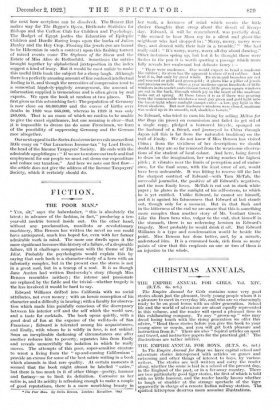THE "DAILY MAIL" YEAR BOOK FOR 1923.* Tim" Daily Mail"
Year Book continues to be one of the wonders of the reference world. There is no annual of any shape or kind which manages to get so much miscellaneous and up-to- date information stuffed into so small a space and yet to do it with a kind of irresponsible lightness which is quite attrac- tive. The little scarlet book flits from flower to flower— or, as the condemner of statistics and politics might say, from cabbage to cabbage—in the most delightful way. On one page we hear of abatements from Income-tax and • The "Daily Mail" Year Book for 1923. By David Williamson. London Associated Newspapers, Ltd. 118.]
the next how acetylene can be dissolved. The Beaver Hat makes way for The Beggar's Opera, Birth-rate Statistics for Bishops and the Carlton Club for Children and Psychology. The Budget of Egypt jostles the Education of Epileptic Children and Hurdle Racing leaps upon the backs of Julian Huxley and the Hay Crop. Floating like jewels (we are bound to be Hibernian in such a context) upon this flashing torrent of mixed events come The Orphans of the Storm and the Estate of Miss Alice de Rothschild. Sometimes the entries brought together by alphabetical juxtaposition in the index suggest a kind of irony. But it would be most unfair to make this useful little book the subject for a cheap laugh. Although there is a perfectly amazing amount of fine confused intellectual feeding in it, and though the necessities of compression tend to a somewhat higgledy-piggledy arrangement, the amount of information supplied is tremendous and is often given by real experts. We open the book at random at two places. The first gives us this astonishing fact : The population of Germany is now close on 60,000,000 and the excess of births over deaths in 1920 was 666,000, whereas in 1919 it was only 280,000. That is an omen of which we confess to be unable to give the exact significance, but one meaning is clear—that it is impossible to dream (as do some Frenchmen, we fear) of the possibility of suppressing Germany and the German race altogether.
Our next appeal to the SortesA-nniversariae reveals an excellent little essay on "Our Luxurious Income-tax" by Lord Decies, the head of the Income Taxpayers' Society. He ends with the admirable apophthegm : "If we are to restore our trade and find employment fur our people we must cut down our expenditure and reduce our taxation." And here we note our first flaw— the article does not give the address of the Income Taxpayers' Society, which it certainly should do.







































































 Previous page
Previous page